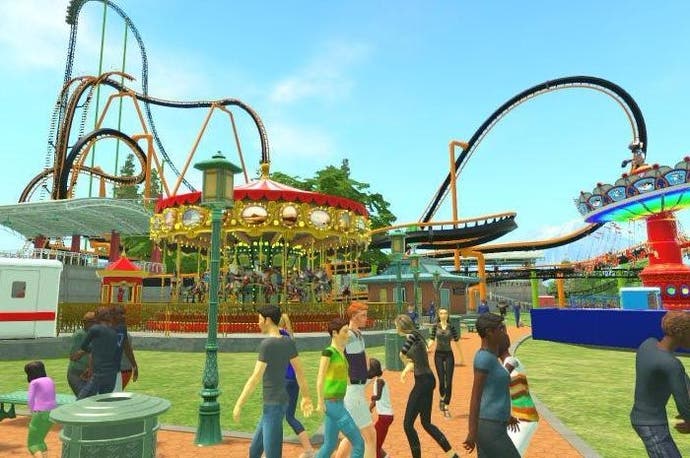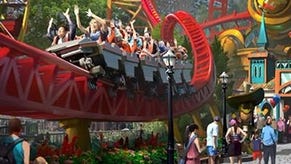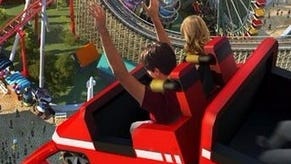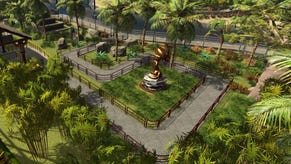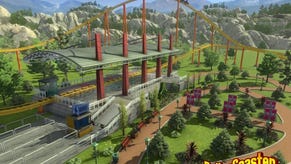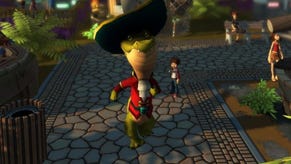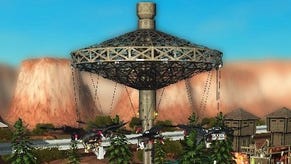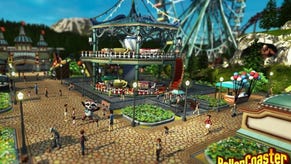Rollercoaster Tycoon World review
Exit through the thrift shop.
My experience playing Rollercoaster Tycoon World began with confusion. Upon launching, it presented me with an entirely black screen, and remained that way for the duration of my mid-afternoon coffee-break. As black screens go it's a very good one, the kind of fathomless void you'd expect Lovecraftian horrors to float around in. In fact, I briefly wondered if this was Rollercoaster Tycoon World's new, avant-garde direction, a theme-park sim set in a dimension where the rides drive you insane.
Alas, it was merely a bug, something to do with the game failing to sync with the Steam cloud, and one of a litany of issues that has Tycoon fans worked up to a level of frenzy usually reserved for hungry sharks. Indeed, a common refrain amongst Steam user reviews is that it's "Worse than No Man's Sky", which in the language of High Internet means "Worse than the Tay Bridge Disaster."
Rollercoaster Tycoon World is worse than No Man's Sky, but not in the way that the Steam users mean that. A nasty part of me wishes it was "car-crash into an orphanage for bush-babies" levels of awful, because it would be more interesting to write about. Yet developer Nvizzio has put in a fair amount of work since the game's atrocious Early Access debut, and the result is a game that is merely a bit shit.
What we're faced with is the boggiest of bog standard theme-park builders. You are Alton, God of Rollercoasters, and from your lofty position in the skybox, you're tasked with transforming a prime piece of wilderness into an offensively expensive way for weary parents to alleviate the mithering for a few hours. You lay pathways, plonk down rides, scatter a few toilets around for your punters to vomit their twelve-dollar hotdogs into, before raking in enough money to buy a four-year stay in the White House.
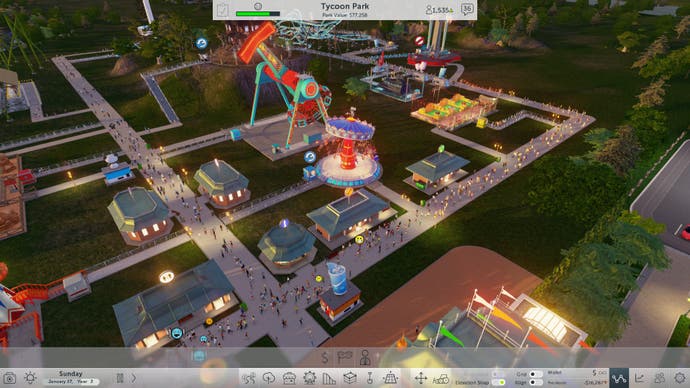
There are three ways to play Rollercoaster Tycoon World. Career mode, sandbox, and unlimited sandbox. The career mode essentially acts as a tutorial for the game's systems, with each of the eight stages setting a new challenge that instructs you on a different mechanic. One stage asks you to return a run-down theme park to its rails by installing some basic facilities, while another has you building a park around a deep gorge, thus introducing you to the terrain sculpting mechanics.
It's a nice idea, save for one cavernous flaw. Most of these stages don't require you to build a theme park of any kind. All you need to do is complete the basic objectives and you can scurry off to the next stage. Hence, you can whiz through the entire career mode in about two-to-three hours.
You may think this a good thing, as it means you can swiftly move on to sandbox, which is where the fun of these types of games is ultimately to be had. Except, you can only unlock new rides and coasters by completing "optional" challenges in the career mode, a baffling design decision that defeats the point of having a progressive sandbox mode in the first place. Nevertheless, if you want to just dive-in and construct a great-big theme park, Unlimited Sandbox offers all the rides and infinite funds to do so.
At an elementary level, Rollercoaster Tycoon World works adequately. Creating paths and placing rides is straightforward and intuitive. Sculpting terrain is also very easy, enabling you to flatten mountains or create vast lakes within minutes. My only gripe about the basics is having to manually remove trees and rocks that obstruct building projects, a chore which is both fiddly and, for larger rides, time-consuming.
Meanwhile, the game's main attraction, the ability to create your own rollercoasters, is largely enjoyable. RTW's coasters are built using a node-system. Stretches of track are pulled out with the mouse and fixed into place with a click. These can be manipulated later by selecting emplaced nodes or adding new ones to the track. Twists and elevations can be tweaked with the mouse-wheel. Perhaps most importantly, testing the coaster always provides clear feedback on things like safety, intensity, and entertainment.
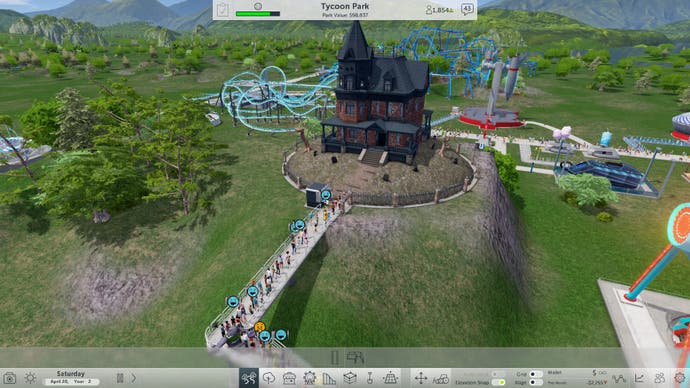
Like a knock-off Rolex, Rollercoaster Tycoon World is cheap but functional. And that would be fine, if I was using Rollercoaster Tycoon World to keep time. But this is a simulator, and you simply cannot cheap out on good simulation.
The problems begin at an aesthetic level. It's worth noting Nvizzio have made efforts to improve the look of RTW, and some of that has paid off. Rides tick and whirr in a way that is pleasing enough to watch, and up-close, your park-goers look considerably more detailed than they used to. From a distance, however, the crowds clip and judder in an extremely unsightly fashion, while individual animations are rudimentary to say the least. Transitions from queue to ride usually involve your peeps vanishing entirely, before reappearing in their seats as if they're all empowered with Corvo Attano's Blink ability. In addition, the overall aesthetic remains flatter than a salt-plain. There's no verve or life to any of the art, it's all gaudy lumps of colour, blandly sugary like circus candyfloss.
More problematic is the simulation itself, which offers little to no challenge in running your park. As an example, I started the coaster-building stage of the career mode, and immediately had to leave my PC for baby-related reasons, leaving the game unpaused. When I returned half an hour later, I'd made ten-thousand dollars, despite having only one unfinished ride in the park which was unconnected to any paths. I reckon your park could consist of a sign reading "Trespassers will be shot" and you'd still make money in Rollercoaster Tycoon World. It doesn't seem to matter how many rides break down, how deep the pools of litter are, how many deathcoasters you've built, peeps roll up in ever-increasing numbers, to the point where your PC can't take it anymore.
Yes, performance is still an issue. The more objects you place in a park, the longer it takes to place the next object. Once you've built a park that covers several landscape tiles, each new ride causes the game to stagger like a peep who scoffed one too many Four-Gals burgers before hopping in line for the Gut-Wrencher. Eventually, it reaches the point of unplayability, meaning that constructing large parks is virtually impossible.
Even at its best, Rollercoaster Tycoon is utterly derivative. Its sole hint of a novel idea is that from time to time your park will be visited by "Influencers", bratty social-media stars who come to the park with a specific objective, such as eating at an Italian restaurant, or buying a balloon. Amusing these obnoxious fleshbags provides you with a significant visitor boost. Personally, I'd rather be subjected to a surprise visit from Mistress Closeride the safety inspector than cater to these grinning, entitled oiks. But perhaps that's just me.
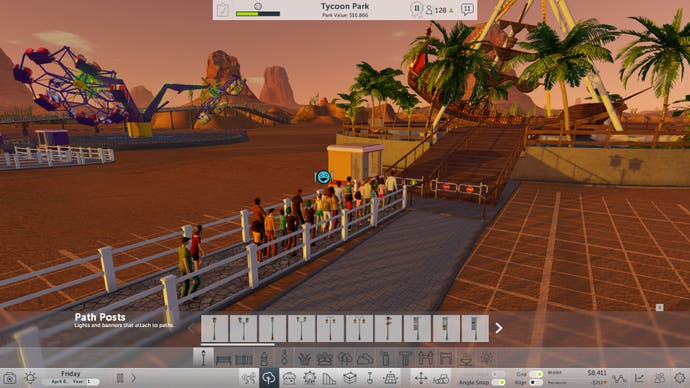
Any other new ideas RTW sports have been cribbed from Planet Coaster. I was trying to avoid comparisons with Frontier's stab at theme-parkery, but RTW's blatant copycatting makes it unavoidable. For example, Planet Coaster sports extensive customisation of almost every ride and object in the game, a feature which RTW lacked until recently. Even the basic "skeletons" of stalls are almost identical in look to those featured in Planet Coaster. Frankly, I find this more irritating than any of the flaws RTW exhibits. It's like a reverse Cities: Skylines, copying the best ideas of another game, but doing them worse instead of better.
That, coupled with how RTW suddenly announced its launch date as the day before Planet Coaster, in a cynical bid to piggyback a few extra sales off befuddled Steam users, is what ultimately earns Rollercoaster Tycoon World the dubious award I'm giving it. It isn't universally terrible, and if it was a noble failure I'd be more inclined to forgiveness. But the way it sidles up a vastly superior game wearing similar clothes is like a celebrity impersonator trying to sell his act at said celebrity's funeral, scurrilous and underhanded. Don't be fooled. Rollercoaster Tycoon World is Dismaland without the irony, a machine designed to fleece your pockets and offer the bare minimum in return.
